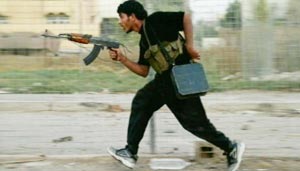
Photojournalist Ghaith Abdul-Ahad's shot of a foreign insurgent in Fallujah before coalition forces launched their assault.
As a U.S. tank comes into view on a Ramadi street, three fighters in civilian clothes and keffiyeh headscarves aim their weapons and wait. They are from the insurgent group Al Qaeda in Iraq. "This is a message to America," one insurgent says to the camera. "Look at your might and power, yet you are unable to walk the streets of Ramadi, which belongs to the mujahideen." He turns back to the tank, which has paused a few blocks away. "I swear by almighty God we will destroy them."
Through interviews and never-before-seen footage featuring insurgent leaders and their foot soldiers, U.S. military personnel and journalists, this FRONTLINE report, "The Insurgency," investigates the people who are fighting against U.S. and coalition forces in Iraq.
During the investigation, the FRONTLINE team must rely on creative techniques to record the insurgents on film. Because it is too dangerous to meet in person, the team is able to obtain the extraordinary footage described above only after giving a camera to an intermediary, who deals with insurgents to obtain the gripping video. After receiving the tape, the team then combines the footage with other interviews and independent analysis to build a complex profile of insurgent forces. "The Insurgency" also includes compelling personal video from Australian journalist Michael Ware, Baghdad bureau chief for Time magazine and one of the reporters with the most in-depth access to insurgent leaders.
Baathist loyalists who had fought for Saddam made up the initial resistance to coalition forces. "Before, I carried my weapon as an officer in the Iraqi army against the Americans," says Abu Mohammed, a senior leader within the Iraqi nationalist branch of the insurgency. "So it is natural I would fight the Americans now. The resistance is a natural reaction to any occupation." Slowly, however, Baathist groups ran low on funding. This provided an opening for Abu Musab al-Zarqawi and other foreign fighters, who used lots of cash and an Islamic ideology persuasive to some Iraqis to increase their influence.
Ghaith Abdul-Ahad, an Iraqi photojournalist who has risked his life to report on the foreign fighters in Iraq, provides unique insight into their mindset. In Fallujah, he met an insurgent from Yemen just days before the U.S. and Iraqi forces attacked the city. "This guy would sit and would tell me about his family back in Yemen," says Ghaith. "He would tell me about his wife, … his children and the young daughter that he loves very much. And then … he would dismiss this: 'Oh no, no -- this is the devil trying to tempt me away from my jihad.'"
"The Insurgency" goes to the city of Tal Afar shortly after it is retaken by U.S. and Iraqi troops to document the brutality inflicted there by Al Qaeda in Iraq. The insurgents had utilized the northwestern city as a staging post for equipment and reinforcements brought in through Syria and had terrorized the local population. "They killed [my brother]. They cut his stomach open and put bombs inside," says one resident. "They left him by the roundabout next to the petrol station. My father wanted to go and pick his body up. They blew up my father."
Other insurgent groups condemn this behavior. Abu Mohammed, for example, draws the line at killing innocents: "The national resistance does not accept these actions. We do not accept the killing of civilians or the Iraqi National Guard or the police. We do not accept the killing of any Iraqi."
How will these points of friction affect the future of the insurgency? "Zarqawi remains a force to be reckoned with," says Michael Ware. "However, through the attrition of war, he has lost men, materiel and leaders. Some of that personnel and that leadership has been replaced with Iraqis where once there had been foreigners. That has brought about at first subtle, now much more tangible changes."
One tangible change was the insurgent response to recent national voting. In January 2005, Iraq's Sunni population spurned the legislative elections, and insurgents carried out widespread attacks on polling stations, killing at least 44 people. Ten months later, during the voting for the new constitution, there was broad Sunni participation and only a few attacks. Coalition security forces were partially responsible, but the decisive factor was Sunni nationalist insurgents, who had decided to go along with the democratic process, even encouraging their members to vote. "As a resistance, we hope to participate in this political process," says Abu Mohammed.
The insurgency's current shift from violence to the ballot box may be the country's best hope to resolve the conflict. Col. Mohammed Faiq of the Iraqi army is candid about the situation confronting his country: "If the coalition forces left Iraq, that would be the end of Iraq, the destruction of Iraq. You could forget about a country called Iraq." But differences of opinion within the insurgency may provide a political opening. "Extreme Islamists, they don't believe in politics," says Ghaith Abdul-Ahad. "They don't believe in elections; they don't believe in democracy." Other insurgent voices, however, are more receptive: "At one point, [a senior insurgent leader] went to the mosque, and at the pulpit he said, 'We cannot build a state by car bombs,'" relates Abdul-Ahad. "Now there's a huge split of what to do, what to do with Al Qaeda."
![The Insurgency [home page]](../art/p_title.gif)